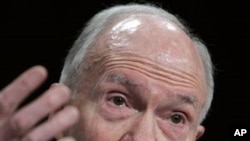The international community is still trying to persuade Iran to end its uranium enrichment program that could lead to the manufacture of nuclear weapons.
For years, the United States and the European Union have said that Iran’s uranium enrichment program is designed to produce a nuclear weapon. But Iran has argued its program is meant only for peaceful purposes, such as generating electricity.
A recent assessment by Israel’s departing intelligence chief, Meir Dagan, indicated Iran will not be able to build a nuclear weapon before 2015 - at the earliest.
Former National Security Adviser, retired Air Force General Brent Scowcroft agrees that at the moment, Iran does not pose a threat.
"To me, the biggest problem with Iran and nuclear weapons is that if Iran is allowed to develop nuclear weapons, it is going to start a rush to proliferation, because I think its neighbors in the region - Egypt, Saudi Arabia, Turkey - will feel compelled to do the same thing for their own protection," said Scowcroft. "That is not a development that we should want to encourage."
In an effort to persuade Iran to end its nuclear program, the United Nations Security Council has passed four sets of resolutions imposing sanctions on Iran. In addition, several other nations, including the United States, have imposed their own measures.
During a recent visit to Abu Dhabi, U.S. Secretary of State Hillary Clinton said the sanctions are working.
"They have made it much more difficult for Iran to pursue its nuclear ambitions," she said. "Iran has had technological problems that have made it slow down its timetable. So we do see some problems within Iran. But the real question is how do we convince Iran that pursuing nuclear weapons will not make it safer and stronger, but just the opposite."
General Scowcroft says the international community must put more pressure on Iran.
"The thing that we are moving toward, but we are not completely there yet, is to have the entire international community confront Iran and say ‘No, do not go there.’ We are making progress," said Scowcroft. "The Russians have now decided not to sell anti-aircraft missiles to Iran. They have agreed to tougher sanctions. The Chinese agree. If we can get them fully on board, an international community says to Iran, 'Do not go there. We are aware you have security problems; we will help you solve them; but nuclear weapons are not the way to go.’ I think there is still a chance that we might make progress."
Retired Marine Corps General Anthony Zinni, an expert on the Middle East, agrees that Iran should be subjected to more international pressure. But he also believes the West must help internal dissidents within the country.
"The Green movement, I think, should have been more supported by us and others," he said. "I think the Iranian leadership and regime fears more internal pressures. And I think if they saw more international and regional cooperation in supporting sanctions and putting pressure on them, and more support for the movements inside - the Green movement which is a collection of a number of different movements - I think that would have the greatest effect on them, rather than just saber-rattling."
General Zinni was referring to some experts who have called for military strikes against Iran. Zinni is against such a move, so is Brent Scowcroft.
"I do not think that is the solution. I think it is important that Iran feels some pressure, but strikes against Iran first of all delay, they do not prevent Iran from becoming a nuclear power," he said. "It would result in a further alienation of the United States and the West from the Muslim world. The consequences for us would be a deep military involvement for decades, maybe, in the region. It may come to that, but I think that should be way down our priority list."
The Obama administration has favored the diplomatic route in its dealings with Iran. At the same time, U.S. officials have said all options are on the table - diplomatic parlance meaning military strikes have not been ruled out.





